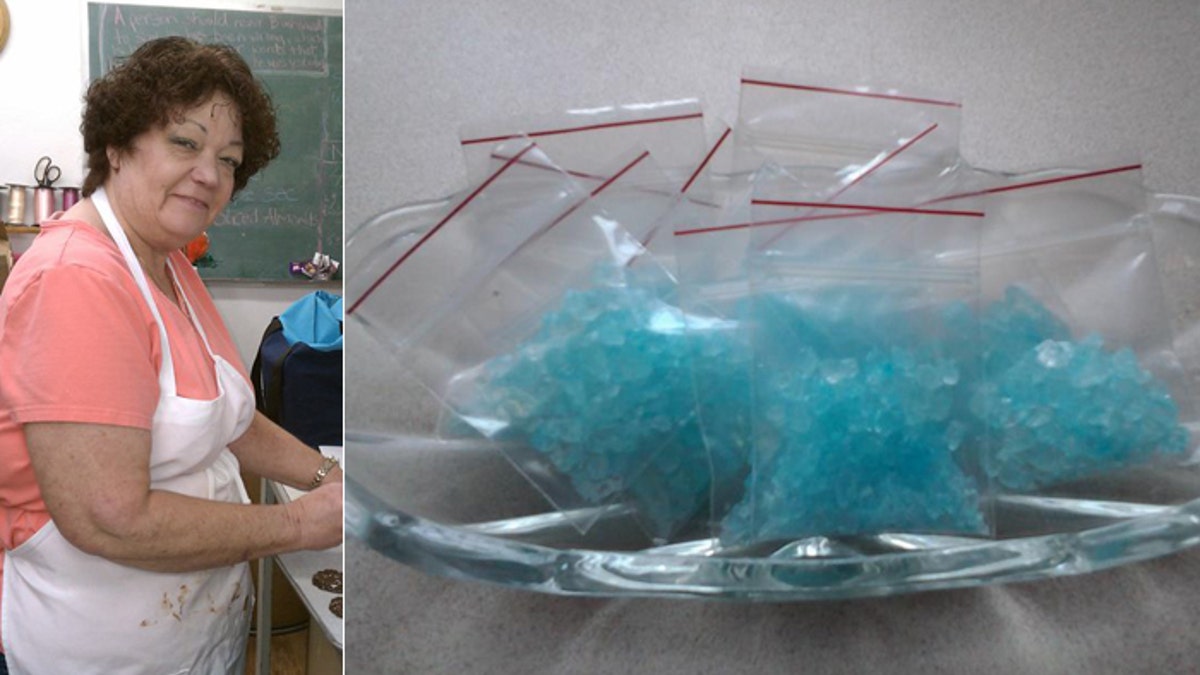
Debbie Ball's "meth" candy was a stunt double for the real thing during the first two seasons of "Breaking Bad," but she's under fire now after two kids shared it on a school playground.
Debbie Ball has seen what meth can do up close, and insists that the "Breaking Bad"-inspired confections she makes in her candy shop aren't hurting anyone -- even though it got a couple of elementary school students in big trouble.
"Crystal Meth Cinnamon Candy" and "Heisenberg's Finest Crystal Blue Meth Candy" started out as props for the hit television show that was set in Albuquerque. But when tourists started asking for it, Ball obliged. Now, her Candy Lady Shop in the city's tony Old Town section is known for its meth candy, but not everyone in town is sweet on the idea.
"It's a prop, that's all it is," Ball told FoxNews.com. "I don't sell it to children."
[pullquote]
But kids can still get their hands on it. Last week, Gabriel Valdez, 10, and Christian Valdez, 9, were suspended from Reginald Chavez Elementary School for bringing rock crystals to school and sharing them with classmates on the playground. Their mother said they were sent home with a slip of paper accusing them of bringing drugs to school. Monica Armenta, spokeswoman for the Albuquerque Public Schools, said the students were suspended for one day on Monday for "disrupting the educational process."
"One of the boys told a classmate they were eating meth," Armenta said of the candy purchased from the Candy Lady. "It's hard to understand why a parent would buy a child candy that mimics a narcotic."
Virginia Valdez pulled both kids out of school and enrolled them at another school.
"This has been blown out of proportion," Valdez said.
But the incident has sparked a controversy over what, if anything, should be done about candy that is designed to look like a dangerous drug.
"I think this is inappropriate for adults to sell this product," said New Mexico State Rep. Antonio Maestas. "I would ask them to stop selling this item and the city should consider an ordinance to make her stop."
Maestas' house colleague, Gail Chasey, said the problem may not be one for lawmakers to tackle.
"It reminds me of candy cigarettes, which are totally unacceptable now," Chasey said. "I would hope that a state law is not necessary to prevent a lapse in judgment by a candy store."
Ball, who said the mother of her two grandchildren had died of an overdose, said neither the candy nor the show glorified drug use. Rather than suspend the students, the school could have turned the incident into a teaching opportunity, she said.
"A lot of people have criticized me because it sends a wrong message," Ball said. "Watch the show. These are the choices you make and in the end you die."
The federal Drug Enforcement Administration has no qualms with Ball's product.
"We recognize it is a novelty item, and schools and parents should decide what to do with it," said Eduardo Chavez, spokesman for the DEA's Albuquerque office.






































